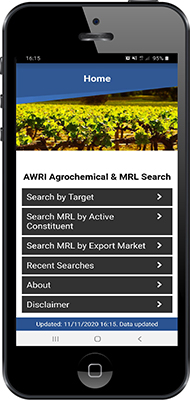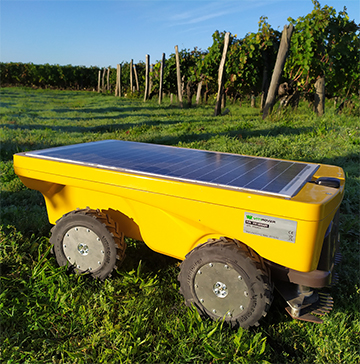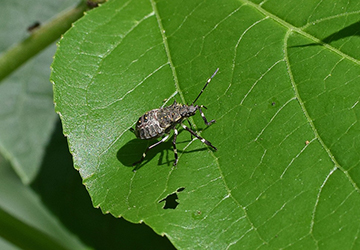Sustainable Winegrowing Australia news
Trends in vineyard and winery technologies
Order the latest AWRI staff publications online
New agrochemicals app |
|
 |
The AWRI has recently relaunched its agrochemicals app, following a major project merging its databases of agrochemical and MRL information into a single system. The new app, called ‘AWRI Agrochemical and MRL Search’, allows users to perform agrochemical and MRL searches from a single platform. The app is available for free from the Apple and Google app stores. Users of the AWRI’s previous agrochemicals app should remove the old version from their devices as it is no longer supported. For more information, please contact Marcel Essling on 08 8313 6600 or email helpdesk@awri.com.au. |
Sustainable Winegrowing Australia newsThe AWRI, Wine Australia and Australia Grape & Wine have been working closely together over recent months to develop a new annual operating plan (AOP) for Sustainable Winegrowing Australia. The AOP sets out the key strategic goals for the program, its key stakeholders and how it maps against the strategic priorities of the three collaborating organisations. More information about the program, including how to join, is available from sustainablewinegrowing.com.au. The AWRI is also working with several Australian wine regions that have recently been successful in receiving grants to support the adoption of Sustainable Winegrowing Australia. McLaren Vale Rutherglen and Yarra Valley all have projects in progress to support Sustainable Winegrowing Australia members to achieve certification. |
|
Trends in vineyard and winery technologies |
|
 |
During the year AWRI Senior Engineer, Dr Simon Nordestgaard has been keeping in touch with the latest trends in vineyard and winery technologies from across the globe and summarising them for an Australian audience. The use of autonomous robots and tractors in vineyards is one area where there is currently a lot of attention, with task-specific robots available as well as autonomy kits that can be retrofitted to existing tractors. In France, a key driver in vineyard robot development appears to be the automation of under-vine mechanical weeding, in response to pressures to minimise herbicide use. Some key recent developments in autonomous robots and tractors internationally are summarised in this article published in Aust. & N.Z. Grapegrower & Winemaker.
In the winery, many common processes are still quite manual, even in large wineries. Fundamentally, this likely relates to the seasonal nature of wine production; all the grapes arrive in a short time period, meaning that many tanks are needed and it is expensive to fit them all with sophisticated instrumentation. However, automation could improve process oversight and the ability to perform some tasks remotely. Two additional articles published this year in Aust. & N.Z. Grapegrower & Winemaker are available – one reviewing alternative technologies for level measurement and managing wine transfers and one on continuous processes in wineries. |
New eBook titles availableA range of new titles have recently been added to the AWRI’s Grape and Wine eBook Collection. Highlights include the new Halliday Wine Companion, a revised version of Ron Jackson’s vine to glass handbook on Wine Science: Principles and Applications, Isabelle Legeron’s fresh take on Natural Wine and Robert Walters’ myth busting look at Champagne: A Secret History. The full collection is accessible from the eBook Collection page. Access is reserved for Australian growers and winemakers who pay the Grape Research or Winegrape levy. Existing AWRI account holders need only sign in. Eligible new users should register for an account. For further information about the eBook collection or help with other library services and resources please contact the AWRI information services team. |
|
BMSB information online |
|
 |
Brown marmorated stink bug (Halyomorpha halys), commonly known as BMSB, has been identified as a serious biosecurity risk to Australia because of its potential to cause damage to a wide range of crops, including wine-grapes. The AWRI helpdesk team has recently collated the latest information about BMSB on a series of new pages on the AWRI website, covering the characteristics of BMSB, monitoring, management and symptoms of damage. Check out the new BMSB pages to stay aware of this biosecurity threat. Any possible sightings of BMSB (or any other exotic pest) in the vineyard or in goods received from overseas should be reported to the Exotic Plant Pest Hotline on 1800 084 881. |
Order the latest AWRI staff publications onlineAccessing the latest AWRI publications is easy. Visit the AWRI Publications web page to:
The AWRI’s most recent publications are listed below. 2184 Varela, C., Bartel, C., Nandorfy, D.E., Borneman, A., Schmidt, S., Curtin, C. Identification of flocculant wine yeast strains with improved filtration-related phenotypes through application of high-throughput sedimentation rate assays. Sci. Rep. 10: 2738; 2020. 2185 Varela, C., Sundstrom, J., Cuijvers, K., Jiranek, V., Borneman, A. Discovering the indigenous microbial communities associated with the natural fermentation of sap from the cider gum Eucalytpus gunnii. Sci. Rep. 10: 14716; 2020. 2186 Nordestgaard, S. Autonomous vineyard robots and tractors. Aust. N.Z. Grapegrower Winemaker (680): 50-52, 54-60, 62, 64, 66-67; 2020. 2187 Essling, M. Ask the AWRI: The importance of soil organic matter. Aust. N.Z. Grapegrower Winemaker (680): 82-83; 2020. 2188 Smart, R., Bruer, D., Collins, C., Karantonis, C., Lockshin, L., Muhlack, R., Oemcke, D., Pike, B., Wilkes, E. Towards Australian grape and wine industry carbon neutrality… the possible dream. Aust. N.Z. Grapegrower Winemaker (680): 100, 102-105; 2020. 2189 Kang, W., Bindon, K.A., Wang, X., Muhlack, R.A., Smith, P.A., Niimi, J., Bastian, S.E.P. Chemical and sensory impacts of Accentuated Cut Edges (ACE) grape must polyphenol extraction technique on Shiraz wines. Foods 9(8): 1027; 2020. 2190 Onetto, C.A., Schmidt, S.A., Roach, M.J., Borneman, A.R. Comparative genome analysis proposes three new Aureobasidium species isolated from grape juice. FEMS Yeast Res. 20(6): foaa052; 2020. 2191 Pearson, W., Schmidtke, L.M., Francis, I.L., Carr, B.T., Blackman, J.W. Characterising inter- and intra-regional variation in sensory profiles of Australian Shiraz wines from six regions. Aust. J. Grape Wine Res. 26(4): 372-384; 2020. 2192 Coulter, A., Cowey, G., Essling, M., Hoare, T., Holdstock, M., Longbottom, M., Simos, C., Krstic, M. Vintage – observations from the AWRI helpdesk. Wine Vitic. J. 35(4): 39-41; 2020. 2193 Cowey, G. Ask the AWRI: Indole off-flavour in sparkling wine. Aust. N.Z. Grapegrower Winemaker (681): 46-47; 2020. 2194 Bekker, M.Z., Nandorfy, D.E., Kulcsar, A.C., Faucon, A., Bindon, K., Smith, P.A. Comparison of remediation strategies for decreasing ‘reductive’ characters in Shiraz wines. Aust. J. Grape Wine Res. doi: 10.1111/ajgw.12459; 2020. 2195 Cordingly, B. Ask the AWRI: Sparkling wine gushing: not a cause for celebration. Aust. N.Z. Grapegrower Winemaker (682): 42-43; 2020. 2196 Haddad, P.R., Taraji, M., Szücs, R. Prediction of analyte retention time in liquid chromatography. Analyt. Chem. DOI:10.1021/acs.analchem.0c04190; 2020. 2197 Essling, M., McKay, S., Petrie, P.R. Fungicide programs used to manage powdery mildew (Erysiphe necator) in Australian vineyards. Crop Prot. 139: 105369; 2021. |
|
AcknowledgementsThe AWRI acknowledges support from Australia’s grapegrowers and winemakers through their investment body, Wine Australia, with matching funds from the Australian Government. The AWRI is a member of the Wine Innovation Cluster in Adelaide, South Australia. |
|

